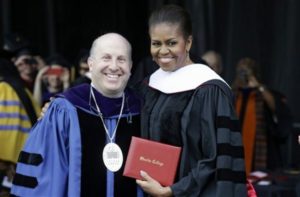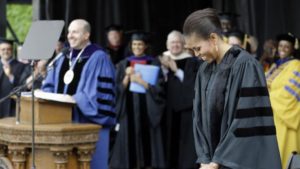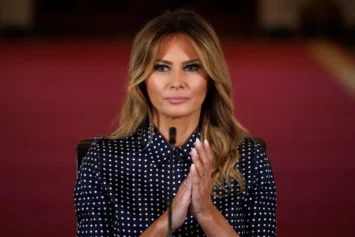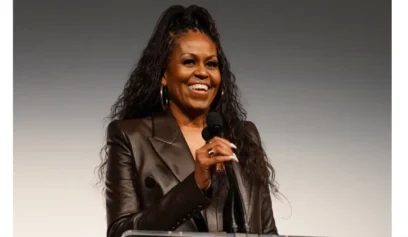
Whether it’s dealing with environmental justice or aiming to close the growing gap in income equality, the first lady told the graduating class at Oberlin College that their movement will have to move beyond just protests and neighborhood volunteering.
While those acts are important, they can also be ineffective if leaders and legislators are not adhering to the voice of the public. That’s when, according to the first lady, the youth must be adamant about getting those people out of office and paying attention to the political landscape that ultimately determines if legislation will reflect the desires of the people.
“You see, it’s wonderful to volunteer at your local homeless shelter—please do that—but you also need to attend the city council meetings and make sure the zoning laws don’t shut that shelter down,” she said. “Are you thinking of teaching in an under-served school? If so, I’m glad to hear that. So many kids need you. But you’ve also got to elect good people to your school board and state legislature, because they decide whether you have the resources you need to inspire and empower your students.”
She even reminded the youth behind the Black Lives Matter movement, that protest after protest won’t be enough to reform the criminal justice system.
“And finally, while peaceful protest can be powerful, if we truly want to reform our criminal justice system, then we need to come together and do the hard work of changing our laws and policies to reflect our values,” she said.
Obama added that it certainly won’t be an easy task and it is one that could take years to see fully realized, but the small steps towards progress are just as essential now as they have been in the past.
“After all, Lucy Stone spent years speaking out for partial suffrage—for allowing women to vote only on things like school issues and local issues—because she realized that full suffrage was just too controversial,” she added.
But it was that nudge towards full suffrage that helped the movement pick up speed and Obama encouraged students to keep that in mind and realize that even as their fight continues for the sake of equality and justice for all people in America, they must also remember the importance of the small steps that will eventually lead to the tomorrow they have always dreamed about. And with every step the youth make, they must be prepared to take another and another and another until their ultimate goal has been realized.
She said that’s what made the founders of Oberlin, the first college in America to “officially embrace the admission of Black students and the first co-ed school to grant bachelor’s degrees to women,” so remarkable. Rather than feel fulfilled by allowing Black students on their campus and granting them degrees, the group realized that even that degree would be purposeless without widespread policy changes.
So they helped lead civil rights marches and sit-ins and began “organizing exchange programs with historically Black colleges and universities” in hopes that they could continue to expand the impact they had on the move for equality and civil rights.
“Because they knew it wasn’t enough to welcome women and African-American students to Oberlin if they would only graduate in four years to be second-class citizens in their own country,” she added. “They knew that our policies matter. They knew that our laws matter. And I know, as [Oberlin College] President Krislov understands, that electing the right folks matters—it matters a lot.”

First lady Michelle Obama smiles as she is introduced by Oberlin College President Marvin Krislov before receiving an Honorary Degree of Doctor of Humanities from Oberlin College, Monday, May 25, 2015, in Oberlin, Ohio. (AP Photo/Tony Dejak)
It matters because it is through policy changes and societal changes that real change will become weaved into the very fibers of America, but it will be a process that forces the youth to boldly confront what the first lady referred to as “noise” and to avoid the temptation to simply surround themselves with like-minded individuals.
While noting the current gridlock that plagues the political landscape today, the first lady urged the graduates to “actively seek out the most contentious, polarized, gridlocked places” they could find because in the past those have been the “places where progress really happens—the places where minds are changed, lives transformed, where our great American story unfolds.”
While the tone of the entire speech may have been overly optimistic to some, she did take the time to acknowledge that the democratic process may not always work the way the public wants it to.
Change doesn’t come about immediately or quickly. Years of small changes are required to complete much-needed overhauls of American systems. But progress, as little as it may be especially when looking at the Black community, has still managed to take shape.
“Generation after generation, this country has become more equal, more inclusive, more fair, more free,” she said. “My life and so many of your lives are a testament of that truth.”
Of course, such milestones such as the country’s first Black president or the growing number of Black graduates are societal changes that do a lot more for the perception of Black progress than it does for the actual progress of the oppressed community.
At the core of the speech, however, was a message of hope—one that the Obama administration has become known for. But this hope was driven specifically by the youth in the audience and across the nation who have taken a grassroots approach to creating change in their own neighborhoods and have utilized the tools of today to craft massive marches and take control of their own narrative.
Now, the first lady hopes that with the proper political involvement as well, today’s young activists can use their “smart, compassionate, thoughtful voices” to widen America’s strides towards equality and justice.


